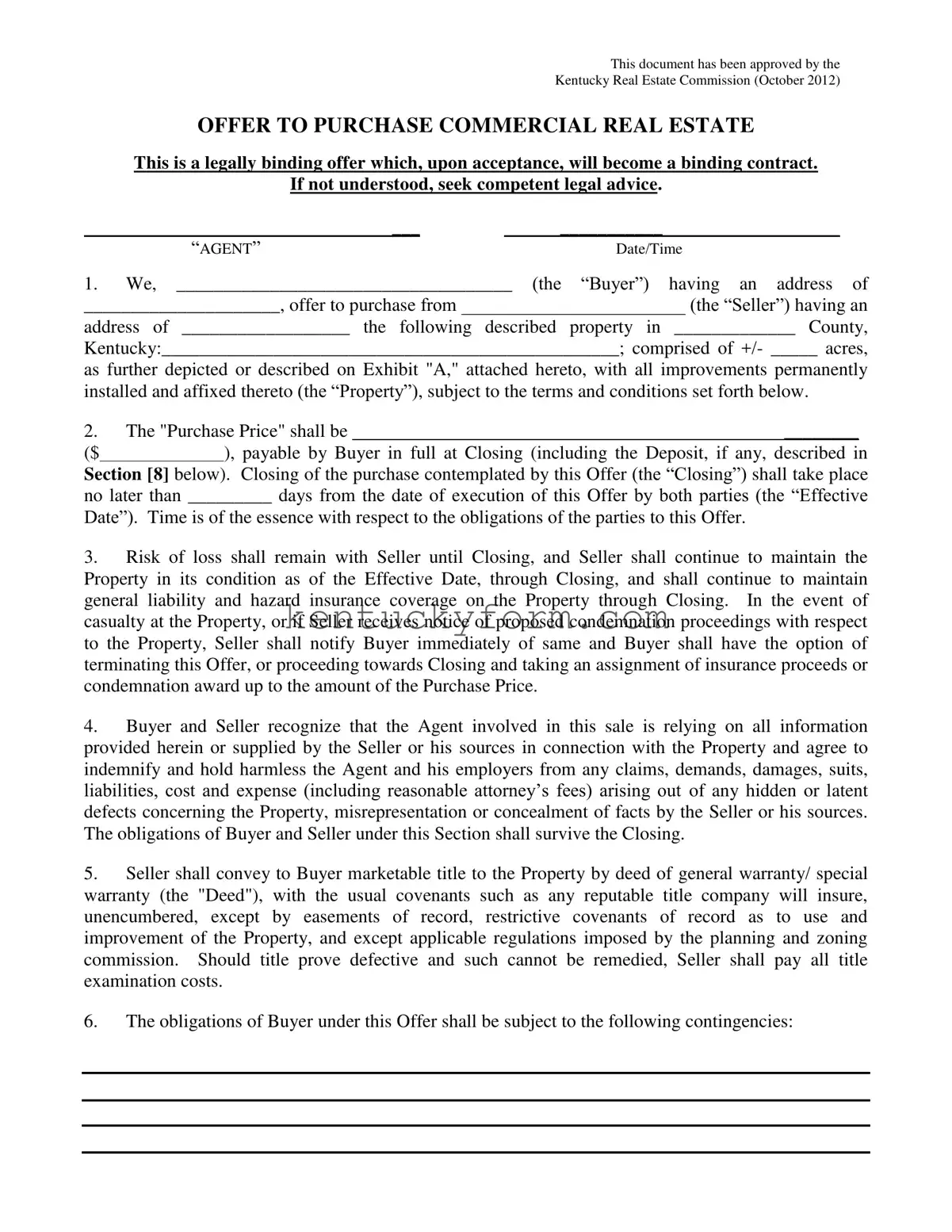This document has been approved by the
Kentucky Real Estate Commission (October 2012)
OFFER TO PURCHASE COMMERCIAL REAL ESTATE
This is a legally binding offer which, upon acceptance, will become a binding contract.
If not understood, seek competent legal advice.
|
___ |
|
|
___________ |
|
|
“AGENT” |
|
|
Date/Time |
1. |
We, ____________________________________ |
(the “Buyer”) having an address of |
_____________________, offer to purchase from ________________________ (the “Seller”) having an
address of __________________ the following described property in _____________ County,
Kentucky:_________________________________________________; comprised of +/- _____ acres,
as further depicted or described on Exhibit "A," attached hereto, with all improvements permanently installed and affixed thereto (the “Property”), subject to the terms and conditions set forth below.
2. |
The "Purchase |
Price" shall be |
________ |
|
($ |
), |
payable by Buyer in full at Closing (including the Deposit, if any, described in |
Section [8] below). Closing of the purchase contemplated by this Offer (the “Closing”) shall take place no later than _________ days from the date of execution of this Offer by both parties (the “Effective
Date”). Time is of the essence with respect to the obligations of the parties to this Offer.
3.Risk of loss shall remain with Seller until Closing, and Seller shall continue to maintain the Property in its condition as of the Effective Date, through Closing, and shall continue to maintain general liability and hazard insurance coverage on the Property through Closing. In the event of casualty at the Property, or if Seller receives notice of proposed condemnation proceedings with respect to the Property, Seller shall notify Buyer immediately of same and Buyer shall have the option of terminating this Offer, or proceeding towards Closing and taking an assignment of insurance proceeds or condemnation award up to the amount of the Purchase Price.
4.Buyer and Seller recognize that the Agent involved in this sale is relying on all information provided herein or supplied by the Seller or his sources in connection with the Property and agree to
indemnify and hold harmless the Agent and his employers from any claims, demands, damages, suits, liabilities, cost and expense (including reasonable attorney’s fees) arising out of any hidden or latent
defects concerning the Property, misrepresentation or concealment of facts by the Seller or his sources. The obligations of Buyer and Seller under this Section shall survive the Closing.
5.Seller shall convey to Buyer marketable title to the Property by deed of general warranty/ special warranty (the "Deed"), with the usual covenants such as any reputable title company will insure, unencumbered, except by easements of record, restrictive covenants of record as to use and improvement of the Property, and except applicable regulations imposed by the planning and zoning commission. Should title prove defective and such cannot be remedied, Seller shall pay all title examination costs.
6.The obligations of Buyer under this Offer shall be subject to the following contingencies:
7.At Closing, all leases, if any, affecting the Property shall be assigned to Buyer, all advance rental collections, if any, and taxes due and payable in the calendar/fiscal year of Closing shall be prorated, and all security deposits shall be transferred to Buyer. Seller shall be responsible for execution and delivery of the Deed, and payment of Seller's attorney's fees, any transfer tax, preparation and recording costs of the Deed. Buyer shall be responsible for Buyer's attorney's fees, any costs and fees associated with Buyer's financing, and any costs associated with Buyer's due diligence relating to the Property.
8.As evidence of good faith securing this Offer, a "Deposit" of $____________ shall be made by Buyer upon Seller’s acceptance of this Offer, to be held in escrow by the Agent and to be applied to the Purchase Price at Closing, or refunded to Buyer if Buyer terminates this Offer as a result of Buyer's
failure to satisfy the contingencies set forth in Section 6 above. The Deposit shall only be removed from the Agent’s escrow account, by written agreement of the parties, by court order, or as provided by law, in accordance with KRS 324.111(4). If Buyer fails to perform Buyer’s obligations hereunder, Seller
may/shall accept the Deposit as liquidated damages, and both parties shall sign a document releasing each other from all obligations and liabilities under this Offer. If the Seller fails to perform Seller's obligations hereunder, Buyer may pursue any available remedy at law or in equity.
9.Possession of the Property shall be delivered to the Buyer at Closing.
10.In the event either Seller or Purchaser is participating in a like kind exchange of real property under Section 1031 of the Internal Revenue Code, the other party shall, at no cost to such party, reasonably cooperate in connection with the exchange.
11.Seller agrees to indemnify Buyer against and hold Buyer harmless from any loss, damage or liability incurred by Buyer and arising hereunder, as a result of Seller's negligence or willful misconduct. Buyer agrees to indemnify Seller against and hold Seller harmless from any loss, damage or liability incurred by Seller and arising hereunder, as a result of Buyer's negligence or willful misconduct.
12.Seller shall pay to the above Agent a real estate fee outlined in a separate agreement. All parties
herein acknowledge thatrepresents the interest of the Seller only. The
commission is earned upon acceptance of this Offer, but subject to any contingencies specified herein. If transfer of title is not completed because of failure of Buyer or Seller to perform their respective
Buyer’s Initials: ________________ |
Seller’s Initials:_________________ |
Date/Time: ____________________ |
Date/Time: ____________________ |
|
2 |

obligations hereunder, the defaulting party, in addition to all other remedies provided herein or by law, shall pay the commission provided above and reasonable attorney's fees incurred by the non-defaulting party.
13.Any notice required hereunder, excluding the notice in paragraph 17 below, shall be hand delivered or delivered by certified mail or by nationally recognized overnight delivery service, to the respective addresses for Buyer and/or Seller (as applicable) set forth in Section 1 above.
14.All terms and provisions of this Offer shall be held in confidence by the Seller and Buyer, and neither Seller nor Buyer shall disclose the terms hereof to any third party except for the officers, agents and employees of Seller and Buyer.
15.We have read the entire contents of this Offer and acknowledge receipt of same. We are not relying on verbal statements not contained herein. The Buyer further certifies that Buyer has examined the Property and that Buyer is thoroughly acquainted with its condition and accepts it as such.
16.This clause is optional. It is effective if both parties initial below it.
The parties agree to resolve any disputes arising under this agreement first through mediation and, if unsuccessful, through arbitration taking place in the state of Kentucky. Any disputes within the jurisdiction of the Small Claims Court ($1,500 or lower) will be handled by that court.
Submitted ata.m./p.m. EST, on ___________, 20___. Unless accepted and delivered to
Buyer by ______ a.m./p.m. EST, on the _____ day of ____________, 20___, this Offer shall be null and
void.
Buyer:
By:
Its:
The above Offer is accepted this __________ day of _________, 20___ at ______a.m./p.m. EST.
Seller:
By:_________________________________
Its:_________________________________
Exhibit A
Description of Property
[include deed reference, legal description, drawing or plat]




